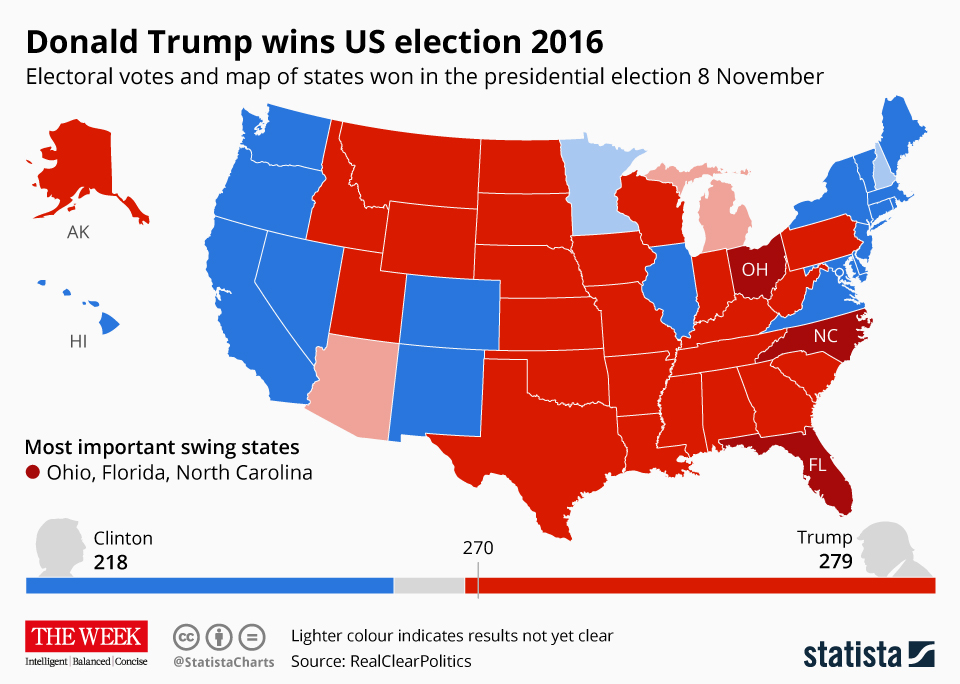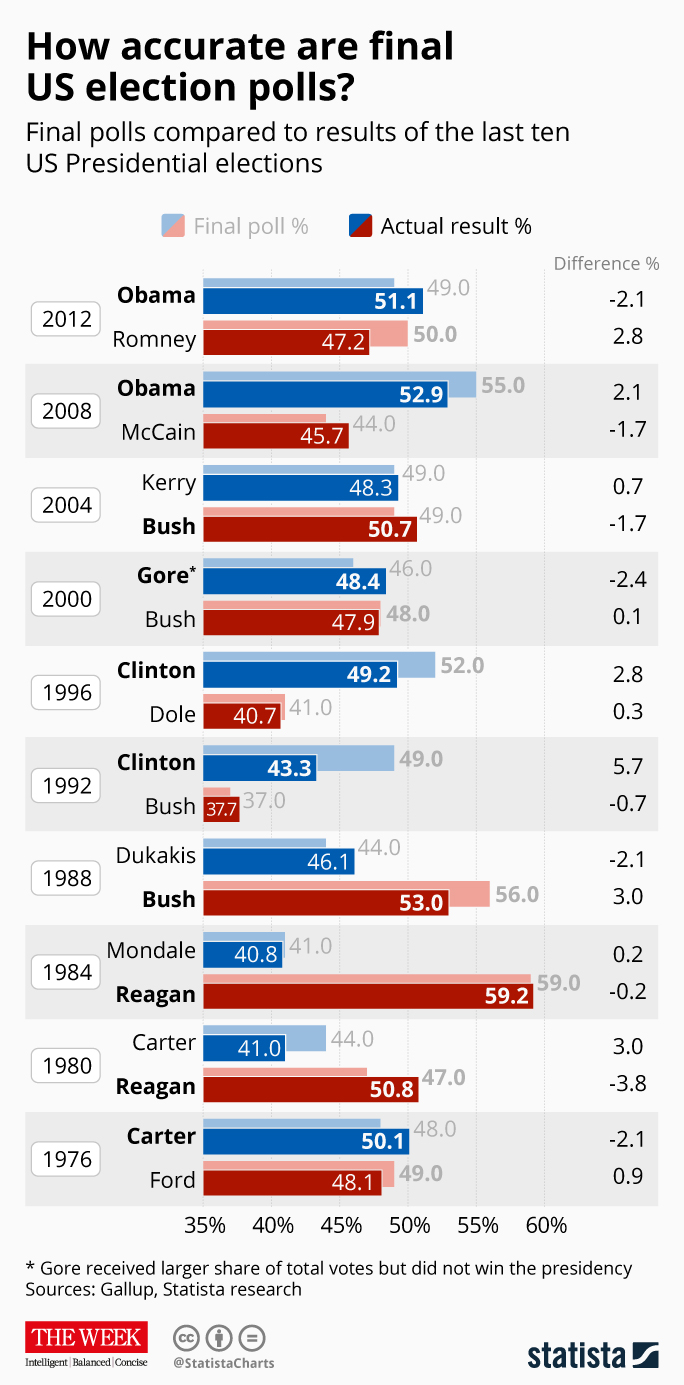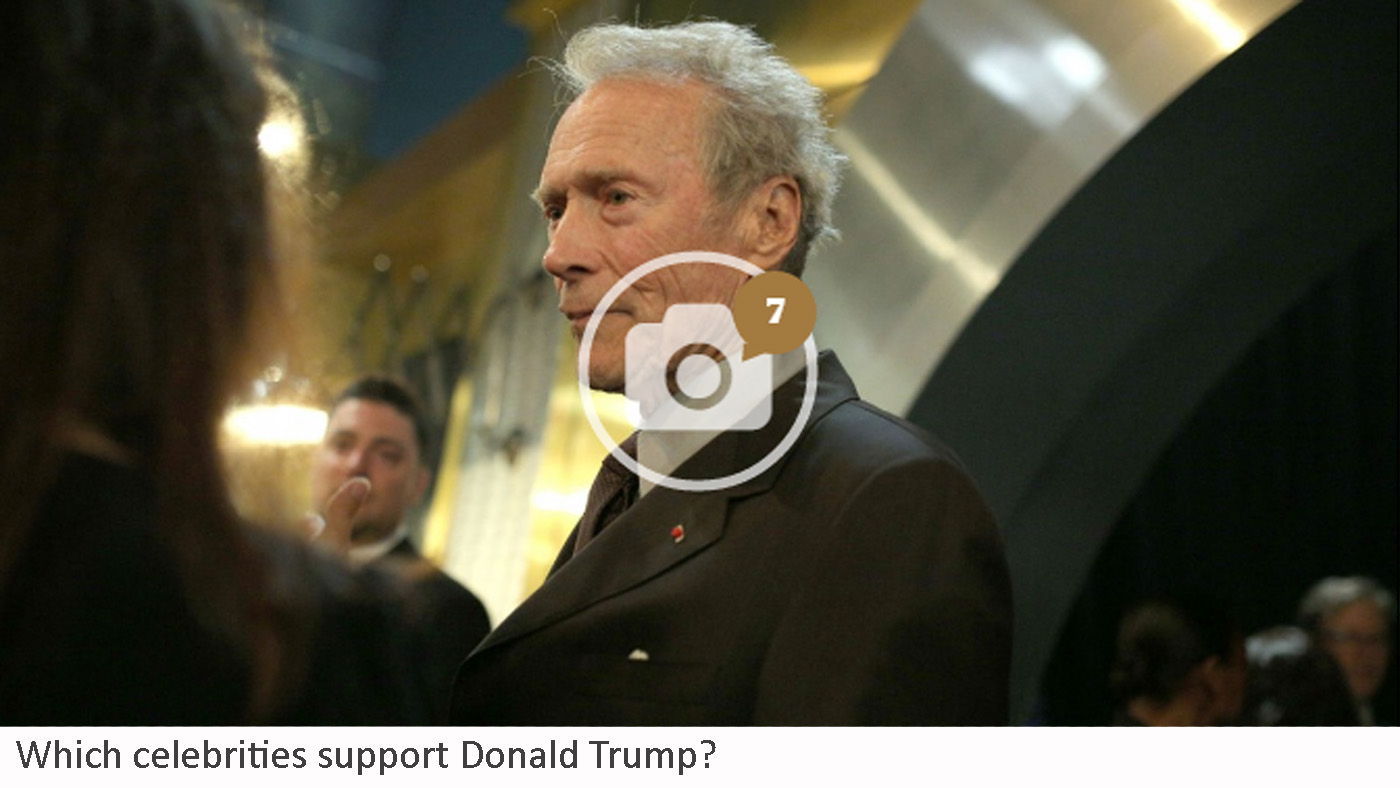Donald Trump sued by two states over business links
Attorney generals of Maryland and DC accuse US President of 'unprecedented constitutional violations'
A free daily email with the biggest news stories of the day – and the best features from TheWeek.com
You are now subscribed
Your newsletter sign-up was successful
US election: How did the polls get it so wrong on Trump?
10 November
One of the biggest reasons Donald Trump's win on Tuesday was so shocking is that pollsters failed to predict he would end up in the White House.
Individual and aggregated surveys put Democrat Hillary Clinton ahead for the vast majority of the campaign.
The Week
Escape your echo chamber. Get the facts behind the news, plus analysis from multiple perspectives.

Sign up for The Week's Free Newsletters
From our morning news briefing to a weekly Good News Newsletter, get the best of The Week delivered directly to your inbox.
From our morning news briefing to a weekly Good News Newsletter, get the best of The Week delivered directly to your inbox.
The predictions were not completely wrong on the popular vote, however. According to the New York Times, the latest tally shows Clinton won 230,000 more votes than her Republican rival - 47.7 per cent to Trump's 47.5 per cent.
But when it came to the Electoral College, he was clearly in the lead, winning 279 votes to 228."Pollsters flubbed the 2016 presidential election in seismic fashion," says USA Today, adding that Trump's victory dealt a "devastating blow to the credibility of the nation's leading pollsters, calling into question their mathematical models, assumptions and survey methods".
It will take a while to figure out exactly why the pollsters got it wrong, says opinion-poll analysis blog FiveThirtyEight, which had put Trump's chances of winning at 28.6 per cent. There could have been a "systematic polling error" or a shift towards Trump among the electorate after many of the final surveys ended.
Some polls also finished before the "full effects" of FBI director James Comey's letter to Congress could be felt, it adds.
A free daily email with the biggest news stories of the day – and the best features from TheWeek.com
Pollsters interviewed by FiveThirtyEight were divided over whether Trump voters were "too shy" to tell the truth, although some noted he did better in surveys conducted by a recorded voice rather than a live one.
Others believe the Democrats suffered from a lower-than-expected turnout.
The USC Dornsife/LA Times poll, which consistently showed a better result for Trump, faced much criticism during the campaign. The surveys, carried out online, asked respondents to rate their level of commitment to their candidate on a scale of one to 100.
"Some of the worst failures of polling have come about because pollsters, whether deliberately or not, converged on a single view of an election, in what is often referred to as 'herding'," claims the LA Times.
"With all the challenges that polling faces, it's important to test different methods and approaches to surveying public opinion. Some tests will work, others won't, but the only way to know is to try."
Donald Trump wins the presidency
9 November
Donald Trump has claimed the US presidency, having defied the polls, the pundits and many senior members of his own party to pull off a surprise win.
Votes are still being counted in several US states, but the Republican looks set to clinch the 270 electoral college votes he needs within the next few hours. At about 7.30am GMT, NBC News reported that Democrat Hillary Clinton had conceded.
Shortly afterwards, Trump told supporters at his headquarters in New York that he would work to unify a country scarred by a divisive election campaign.
"I pledge to every citizen in the land that I will be president for all Americans," he said. "This is so important to me."
Despite having launched his campaign by describing Mexican immigrants as rapists and drug dealers, Trump said his supporters were drawn from "all races, all religions" and he would work to restore hope and prosperity.
"We will begin the urgent task of rebuilding our nation and renewing the American dream," he said. "It's going to be a beautiful thing."
International investors remain unconvinced. "Reaction to the prospect of a Trump presidency rippled across the globe," says the New York Times, "with financial markets abroad falling as American television networks raised the prospect that Mrs Clinton might lose."

US stock futures "dived 5 per cent, worse than the carnage that followed the British vote to leave the European Union in June that wiped trillions of dollars of value off world markets", Reuters reports. The value of the dollar also fell sharply.
Clinton had seemed poised to become the first female US president, after polls gave her a modest but healthy lead. A Trump aide told CNN: "It will take a miracle for us to win."
But the miracle arrived: Trump outperformed expectations in several key swing states, including Florida, Ohio and North Carolina, and is projected to add to his tally with an unlikely win in Wisconsin.
Yesterday morning, analyst Nate Silver had calculated the chances of a Clinton victory at 71.4 per cent, based on a wide range of polling data.
"In terms of how the polls did tonight, well, the obvious answer is terrible," he said today.
One possible reason for their failure is that voters were "embarrassed to admit even anonymously to pollsters that they planned to support Trump", says Politico.
The Republican Party has also "comfortably" held on to its majority in the House of Representatives, despite modest gains for the Democrats, and looks set to keep hold of the Senate too. That would give a President Trump greater leeway to pass legislation.
However, it remains to be seen how a Republican Party that was openly disdainful of Trump during the election will work with him.
Infographic by statista.com for TheWeek.co.uk.
US election polls: Could Donald Trump really win?
9 November
Polls are beginning to close in the US as the 2016 election, one of the most bitter and divisive in the country's history, draws to a close.
The early results have gone Donald Trump's way: at 12.30am GMT he led Hillary Clinton by 24 electoral college votes to four, having picked up wins in Indiana, Kentucky and West Virginia. Clinton's sole victory so far is in Vermont.
But Clinton remains the favourite to reach the 270 electoral college votes needed for victory.
"A senior adviser from the [Republican] nominee's inner circle sized up the candidate's chances tonight in one stunning sentence," says CNN. "'It will take a miracle for us to win.'"
Earlier in the day, one person was killed and two were injured in a shooting near two polling stations in Azura, California. One polling place was placed on lockdown and voters were instructed to stay away and cast their ballots elsewhere.
The final straight
Last night Clinton and Trump staged last-minute rallies in key battleground states, as final opinion polls show the Democratic candidate with a narrow advantage over her rival as election day arrives.
Speaking to supporters in Michigan, Clinton called the election a choice "between division and unity... between strong and steady leadership and a loose cannon who could put everything at risk".
Trump, in turn, said today "will decide whether we are ruled by a corrupt political class or by yourselves, the people".
Although 8 November is the official polling day, voting has already begun in a number of states, where a "record number of Americans - at least 44.9 million - have voted early by post or at polling stations", the BBC reports.

Early reports reveal a surge in the number of Latino voters turning out in the key states of Florida and Nevada, which many believe bodes well for Clinton.
By some estimates, more Hispanics had voted in Florida by the weekend than in the entire 2012 election.
NBC News polls show Clinton holding a four-point lead coming into the final day of campaigning, down from the double-digit lead she enjoyed in the wake of the Access Hollywood video scandal that threatened to derail Trump's campaign.
But despite his resurgence, the Republican's chances of winning remain slim, in part because of the Electoral College system, which breaks more favourably for Clinton.

"Most polls now project Trump at 200 to 215 electoral college votes, making his task of winning 270 more difficult," writes Kristina Keneally in The Guardian.
The first state results are expected to be announced around 1am in the UK tomorrow and the overall result may be clear by about 5am - unless the race is closer than expected.
Infographic by statista.com for TheWeek.co.uk.

US election polls: What will happen tomorrow?
7 November
With the polls tightening considerably, the final stretch of the US presidential race is proving to be a tense one.
RealClearPolitics's national poll of polls puts Democratic candidate Hillary Clinton 2.5 points ahead of Republican candidate Donald Trump, while some individual surveys have had the two nominees tied in recent days.
The FBI has cleared Clinton of criminal wrongdoing in relation to the emails discovered on a laptop used by her most senior aide, Huma Abedin, but the announcement has come very late in the campaign.
Nevertheless, Nate Silver at FiveThirtyEight predicts that Clinton will win the popular vote by 48.6 per cent to Trump's 45.5 per cent, and gives her a 65.5 per cent chance of winning the election. However, he still believes there is more than a ten per cent chance that Clinton could win the popular vote and lose the Electoral College.
"No matter what happens on Election Day, tens of millions of Americans are going to feel like they got punched in the gut," says Bill Scher at RealClearPolitics.
Trump "superfans" believe America is "on the verge of a 'Brexit' moment, in which a silent nationalist majority outperforms the polls and humiliates the Establishment". Clinton supporters are still "incredulous that an immigrant-bashing, misogynistic blowhard could even make this presidential race competitive", says Scher.
Meanwhile, a survey by New York Times/CBS News shows an "overwhelming majority of voters are disgusted by the state of American politics".
More than 80 per cent of respondents said the campaign had left them repulsed rather than excited.
"In a grim preview of the discontent that may cloud at least the outset of the next president's term, Hillary Clinton and Donald J Trump are seen by a majority of voters as unlikely to bring the country back together after this bitter election season," says the paper.
US election polls: Has Donald Trump lost his chance?
3 November
Hillary Clinton has recaptured the six-point lead she had on Donald Trump before last Friday's FBI announcement, according to a Reuters/Ipsos tracking poll.
The polls tightened considerably after FBI director James Comey revealed he was investigating a new batch of messages that may shed light on Clinton's use of a private email server while she was US secretary of state.
But last night Reuters published a survey in which Clinton led Trump by 45 per cent to 39 per cent, the same margin as a poll from earlier last week showing Clinton at 43 per cent and Trump at 37 per cent.
However, RealClearPolitics puts her just 1.7 points ahead, down from 5.6 points last Thursday.
Should Democrats be in "full freakout mode", asks the Boston Globe. "The numbers still say no. The big pattern has been this: Clinton holds a sizable lead, then the two candidates become statistically tied, and then Clinton's lead grows again."
A new survey from Marquette Law also shows the Democrat's lead is holding up in Wisconsin, which is "significant because the state is a crucial part of Clinton's six-state 'firewall' – her easiest path to winning an Electoral College majority and staving off a late surge from Donald Trump", says Vox.
It explains that since August Clinton's best course for winning the US presidency appears to be through securing the solidly Democratic states as well as these six "lean Democrat" firewall states, which include Pennsylvania, Michigan, Virginia, Colorado and New Hampshire.
Theoretically, this means she could lose the contested swing states of Florida, North Carolina and Ohio and still hold the lead, says Vox.
US election polls: Donald Trump 'no longer a long shot'
2 November
With less than a week to go before the US presidential election, Republican candidate Donald Trump has overtaken his Democratic rival Hillary Clinton in a handful of polls.
The latest Washington Post/ABC News tracking poll gives him a one-point advantage, of 46 to 45, while in the RealClearPolitics national poll of polls Clinton is just 1.7 points ahead. It marks a dramatic gain for Trump since a fortnight ago when he was an average of 7 points behind.
It's unclear whether the narrowing in polls is a result of the FBI's announcement that it has uncovered new emails that might relate to Clinton's use of a personal email server while she was secretary of state, says the Wall Street Journal.
But the tightening of polls – in the final week of "one of the most unpredictable elections in modern history" – has prompted a "shift in tactics" from both sides, says the newspaper.
Clinton has renewed her attacks on Trump, calling him a "bully" who "degrades" women, while Trump has moved away from his focus on Clinton's emails and delivered a speech calling for the repeal of the Affordable Care Act.
But, taking all of the polls into account, Nate Silver at FiveThirtyEight believes Clinton still has a 3 or 4 point lead on Trump.
"Trump remains an underdog, but no longer really a long shot," says Silver. The popular vote "tends to move in tandem" with the Electoral College, he adds, and Clinton would have to be "really unlucky to lose the Electoral College with a popular vote lead like the one she has now".
Some commentators think it will not be enough for Trump to lose by a small margin. "He must get crushed," says Dean Obeidallah at the Daily Beast. "Why? Simple, we need to send a message to Trump – as well as to the rest of our nation – that his sexism, bigotry and racism have no place in America."
-
 The ‘ravenous’ demand for Cornish minerals
The ‘ravenous’ demand for Cornish mineralsUnder the Radar Growing need for critical minerals to power tech has intensified ‘appetite’ for lithium, which could be a ‘huge boon’ for local economy
-
 Why are election experts taking Trump’s midterm threats seriously?
Why are election experts taking Trump’s midterm threats seriously?IN THE SPOTLIGHT As the president muses about polling place deployments and a centralized electoral system aimed at one-party control, lawmakers are taking this administration at its word
-
 ‘Restaurateurs have become millionaires’
‘Restaurateurs have become millionaires’Instant Opinion Opinion, comment and editorials of the day
-
 Why are election experts taking Trump’s midterm threats seriously?
Why are election experts taking Trump’s midterm threats seriously?IN THE SPOTLIGHT As the president muses about polling place deployments and a centralized electoral system aimed at one-party control, lawmakers are taking this administration at its word
-
 ‘Restaurateurs have become millionaires’
‘Restaurateurs have become millionaires’Instant Opinion Opinion, comment and editorials of the day
-
 Should the EU and UK join Trump’s board of peace?
Should the EU and UK join Trump’s board of peace?Today's Big Question After rushing to praise the initiative European leaders are now alarmed
-
 Witkoff and Kushner tackle Ukraine, Iran in Geneva
Witkoff and Kushner tackle Ukraine, Iran in GenevaSpeed Read Steve Witkoff and Jared Kushner held negotiations aimed at securing a nuclear deal with Iran and an end to Russia’s war in Ukraine
-
 Kurt Olsen: Trump’s ‘Stop the Steal’ lawyer playing a major White House role
Kurt Olsen: Trump’s ‘Stop the Steal’ lawyer playing a major White House roleIn the Spotlight Olsen reportedly has access to significant US intelligence
-
 Trump’s EPA kills legal basis for federal climate policy
Trump’s EPA kills legal basis for federal climate policySpeed Read The government’s authority to regulate several planet-warming pollutants has been repealed
-
 House votes to end Trump’s Canada tariffs
House votes to end Trump’s Canada tariffsSpeed Read Six Republicans joined with Democrats to repeal the president’s tariffs
-
 Bondi, Democrats clash over Epstein in hearing
Bondi, Democrats clash over Epstein in hearingSpeed Read Attorney General Pam Bondi ignored survivors of convicted sex offender Jeffrey Epstein and demanded that Democrats apologize to Trump